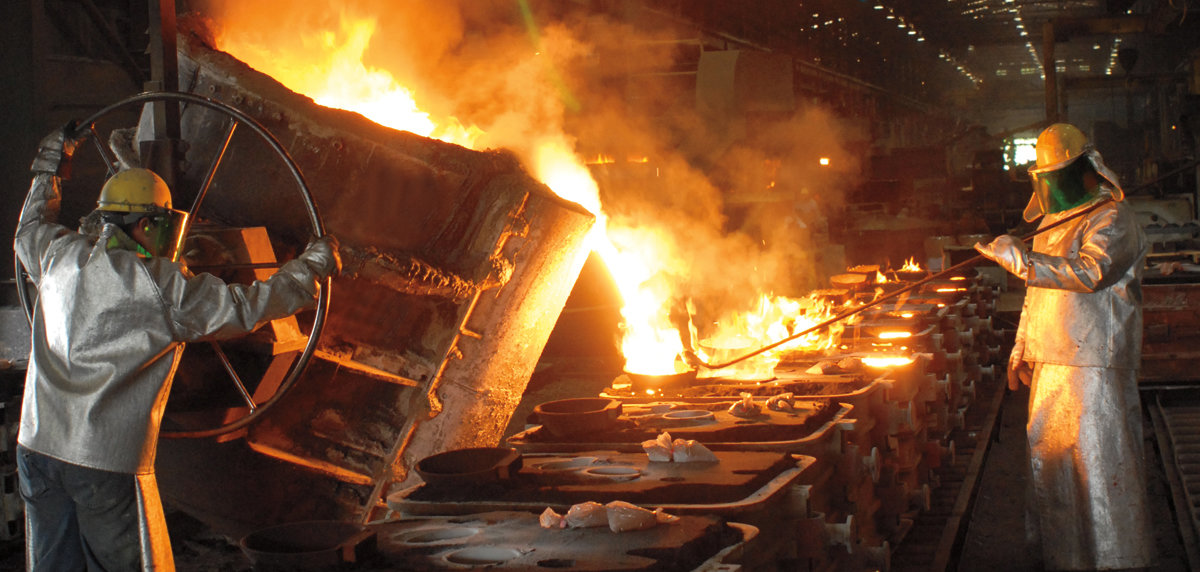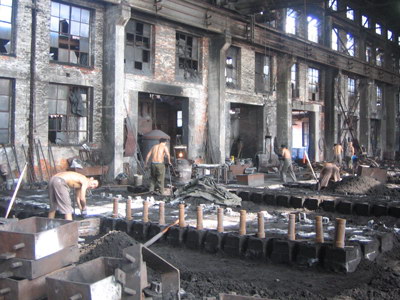Detailed breakdown of how a Metal Foundry transforms scrap into final cast products
Exactly How a Metal Foundry Adds to Sustainable Metal Manufacturing Practices
Metal foundries play a vital function in promoting sustainability within the metal production sector. By integrating recycled products, they reduce reliance on virgin sources and reduce environmental impacts. Energy-efficient melting procedures additionally lessen energy intake and emissions. The journey toward lasting methods involves even more than simply reusing and power administration. It encompasses a broader commitment to honest sourcing and ingenious modern technologies. The implications of these practices are substantial and warrant closer examination.
The Duty of Recycling in Metal Foundries
While metal manufacturing has generally counted on virgin products, the raising emphasis on sustainability has caused a significant change in practices, specifically in metal foundries. Recycling has actually become an essential part of this transformation, allowing foundries to repurpose scrap metal and lower reliance on extracted sources. By incorporating recycled products into their processes, foundries not just reduce environmental impact but additionally lower manufacturing expenses.
Making use of recycled steels, such as light weight aluminum, steel, and copper, minimizes energy intake and lowers greenhouse gas exhausts connected with typical mining and refining techniques. Foundries can accomplish high-quality results by utilizing advanced sorting and handling innovations to assure the pureness of recycled materials. This emphasis on recycling fosters a circular economic situation, where waste is minimized, and resources are utilized effectively. Metal foundries play a crucial function in promoting sustainable methods within the metal manufacturing sector.
Energy-Efficient Melting Techniques
Energy-efficient melting techniques are important for boosting sustainability in metal manufacturing. These strategies substantially minimize energy usage throughout the melting process, which is among the most energy-intensive stages in metal production. Technologies such as induction melting, resistance heating, and microwave melting deal boosted efficiency compared to conventional approaches. Induction melting, for instance, uses electro-magnetic fields to generate warm straight within the metal, lessening power loss and giving accurate temperature level control.
In addition, carrying out heat recovery systems can even more boost performance by recording and recycling waste heat generated during melting. Utilizing innovative insulation materials and maximizing heater designs also contribute to power financial savings. By embracing these ingenious melting methods, metal foundries can lower their carbon impact, lower operational costs, and add to a much more sustainable production landscape. The combination of energy-efficient methods not only straightens with environmental goals however additionally fulfills the growing demand for accountable production methods in the metal market.
Lasting Sourcing of Raw Products
Sustainable sourcing of raw products is crucial for lessening the environmental influence of metal manufacturing. This involves the boosted utilization of recycled metals, the adoption of moral mining methods, and efforts targeted at regional sourcing. By prioritizing these approaches, the industry can promote accountable source monitoring and support regional economic climates.

Recycled Metal Use
How can sectors properly reduce their ecological influence while meeting the growing need for metal? One considerable approach is the use of recycled metal. By integrating scrap metal into their production processes, foundries can decrease the extraction of virgin materials, consequently lowering and preserving all-natural resources power usage. Recycled metals require less energy to procedure compared to their raw counterparts, causing reduced greenhouse gas exhausts. Furthermore, making use of recycled metal helps draw away waste from landfills, promoting a circular economic situation. Industries that focus on recycled metal not just add to sustainability yet likewise gain from expense financial savings related to lowered product purchase. As a result, recycled metal utilization stands as a necessary method for eco liable metal manufacturing.
Moral Mining Practices
While the need for metals remains to climb, industries are progressively identifying the importance of honest mining methods in making certain liable sourcing of basic materials. Moral mining includes a dedication to environmental stewardship, social obligation, and adherence to reasonable labor practices. Firms are currently focusing on partnerships with mines that demonstrate openness in their operations, minimizing eco-friendly effect and respecting local areas. This approach not just cultivates a lasting supply chain yet likewise boosts the reputation of companies included. By applying strenuous requirements and accreditations, industries can fight prohibited mining activities and advertise the welfare of employees. Eventually, moral mining methods contribute considerably to a much more lasting metal production environment, straightening financial growth with ecological and social honesty.
Local Sourcing Efforts

Developments in Metal Casting Processes
Advancements in metal casting processes are transforming the industry by integrating advanced recycling techniques that reduce waste. Energy-efficient melting approaches are likewise being established to lower energy intake throughout manufacturing. In addition, making use of ingenious mold products contributes to enhanced performance and sustainability in casting procedures.
Advanced Recycling Techniques
Advanced recycling techniques are changing metal casting procedures, substantially enhancing sustainability in the industry. These advancements focus on reprocessing and recovering scrap metal, significantly lowering waste and the requirement for virgin materials. Strategies such as hydrometallurgy and pyrometallurgy make it possible for foundries to extract important steels from utilized parts, ensuring efficient resource use. Additionally, progressed sorting and filtration modern technologies improve the top quality of recycled steels, making them appropriate for high-performance applications. This not only decreases the ecological footprint of metal manufacturing but also cultivates a circular economy by advertising the reuse of materials. As these recycling techniques proceed to advance, they promise to further enhance operations within foundries and add to a much more lasting metal production landscape.
Energy-Efficient Melting Methods
While traditional melting techniques have long been the foundation of metal casting, current improvements have actually introduced energy-efficient strategies that substantially decrease power usage and emissions. Technologies such as induction melting and electric arc heating systems have actually obtained importance, permitting specific control over temperature level and lowering the need for fossil fuels. These methods not only enhance power effectiveness but additionally advertise quicker melting times, which equates to lower functional expenses. Additionally, advancements in heat recovery systems make it possible for foundries to capture and recycle excess warm produced throughout the melting procedure. This holistic technique to power management not just supports sustainable methods however likewise settings metal foundries as leaders in the change in the direction of greener production processes, better lining up with worldwide sustainability objectives.
Ingenious Mold Products
As the demand for even more lasting and reliable metal casting procedures grows, the exploration of innovative mold and mildew products has ended up being a centerpiece in the industry. Typical mold and mildew products usually add to ecological challenges, prompting the search for options that reduce waste and power usage. Current innovations consist of the growth of recyclable compounds and eco-friendly binders, which not only improve mold and mildew performance but additionally decrease ecological effect. Additionally, using 3D printing technology in mold production enables for intricate layouts that minimize product use and enable rapid prototyping. These cutting-edge products not just boost casting accuracy but additionally straighten with sustainability objectives, showcasing the market's dedication to minimizing its carbon impact while keeping high-quality manufacturing requirements.
Lowering Waste Through Advanced Technology
Ingenious modern technologies are transforming the metal production industry by considerably reducing waste and boosting efficiency. Advanced Metal Casting information analytics and maker understanding algorithms allow foundries to enhance manufacturing procedures, recognizing inefficiencies and lessening scrap product. Smart sensors keep track of equipment efficiency in real-time, permitting for predictive upkeep that minimizes downtime and waste generation. Additionally, additive production methods, such as 3D printing, permit the production of complex components with marginal material usage, significantly lowering waste compared to typical techniques.
Closed-loop systems are ending up being extra common, where scrap metal and by-products are reused back right into the manufacturing cycle, making sure that materials are used to their greatest capacity. This assimilation of modern technology not just advertises source conservation but also boosts the general sustainability of metal production techniques. By accepting these advancements, foundries can add to an extra sustainable future while maintaining competitiveness out there
The Impact of Foundries on Carbon Impact Decrease
Foundries play a vital role in lowering the carbon footprint of the metal manufacturing sector by applying different lasting techniques. By making use of energy-efficient technologies, such as electrical arc heating systems, these facilities significantly lower greenhouse gas emissions compared to standard approaches. Additionally, foundries increasingly embrace renewable resource sources, which also reduces their reliance on nonrenewable fuel sources.
Recycling scrap metal is an additional vital technique that foundries use, preserving sources and reducing the need for virgin products. This not only decreases waste however additionally reduces the energy-intensive extraction processes connected with mining. The adoption of closed-loop water systems aids to decrease water usage and lower wastewater discharge, adding to a much more sustainable operation.
Via these initiatives, foundries show their dedication to environmental stewardship, causing a significant decrease in the overall carbon footprint of the metal production sector. Their ongoing initiatives are critical in the change toward an extra lasting industrial landscape.
Frequently Asked Concerns
What Types of Metals Are Most Typically Recycled in Foundries?
Light weight aluminum, steel, brass, and copper are among the most commonly recycled steels in foundries. These metals are favored due to their high recycling rates, economic worth, and extensive accessibility, adding substantially to industrial sustainability efforts.
How Do Foundries Ensure the Top Quality of Recycled Materials?
Foundries identify the high quality of recycled products through rigorous testing, sorting, and purification procedures. They execute advanced technologies to assess make-up and remove impurities, assuring that the recycled metals fulfill sector requirements for performance and security.
What Qualifications Exist for Lasting Foundry Practices?
Different qualifications exist for sustainable foundry practices, consisting of ISO 14001 for ecological monitoring, ISO 50001 for power administration, and LEED certification for sustainable building methods (Metal Casting). These certifications help guarantee adherence to ecological and sustainability requirements in operations
Exactly How Do Foundries Gauge Their Carbon Impact Reduction?
Foundries determine carbon impact decrease with tools like lifecycle evaluations, power audits, and exhausts tracking systems. They contrast standard emissions to present outputs, evaluating renovations in power effectiveness, product usage, and renewable resource adoption gradually.
What Are the Economic Advantages of Lasting Metal Manufacturing?
Sustainable metal manufacturing offers financial advantages such as lowered functional expenses, enhanced efficiency, boosted market competitiveness, and possible federal government motivations. Additionally, it fosters innovation and brings in environmentally aware customers, ultimately driving lasting productivity for organizations.
Metal foundries play an important function in advertising sustainability within the metal production market. While metal production has commonly relied on virgin materials, the enhancing focus on sustainability has actually led to a substantial shift in techniques, particularly in metal foundries. By integrating scrap metal right into their manufacturing procedures, foundries can decrease the removal of virgin materials, thereby reducing and saving natural resources power intake. Foundries play a crucial role in lowering the carbon impact of the metal production market by executing various lasting practices. Recycling scrap metal is an additional vital practice that foundries employ, preserving resources and lowering the need for virgin materials.